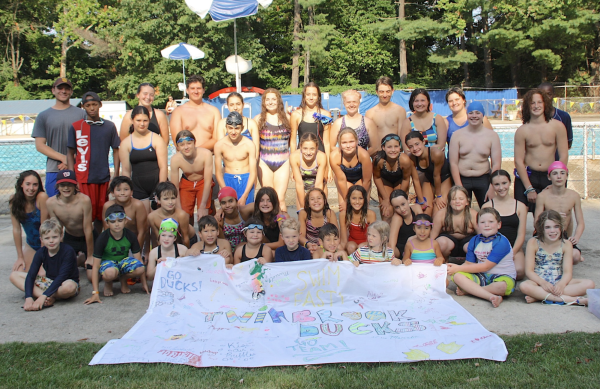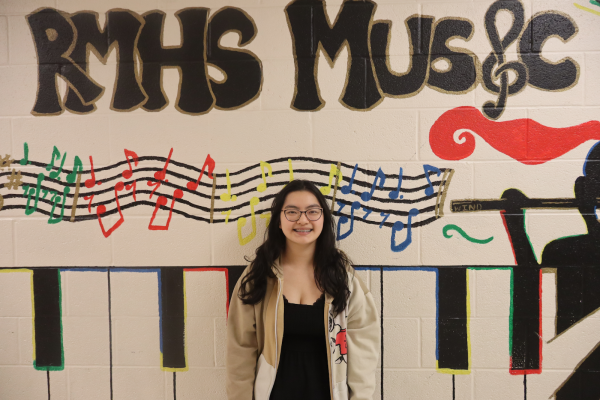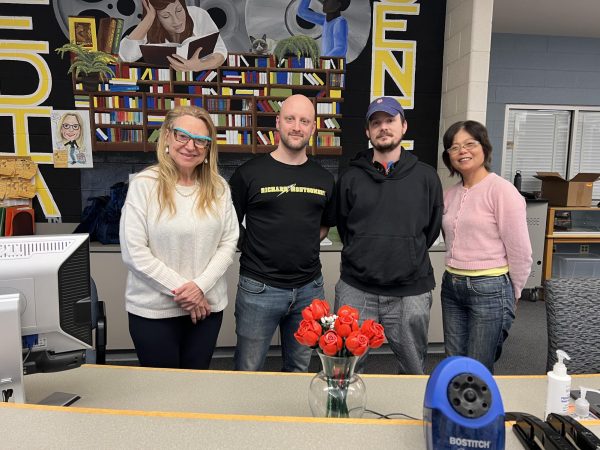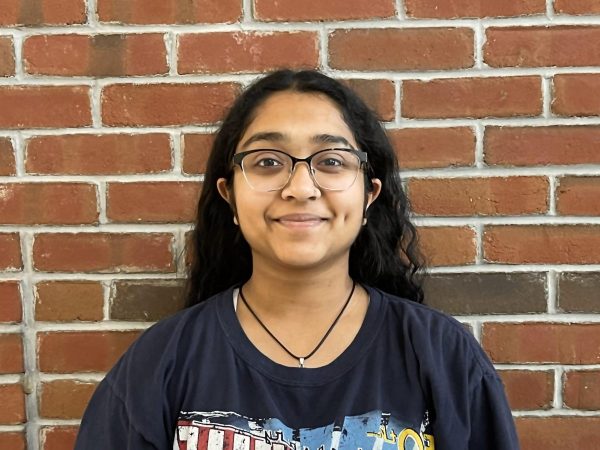Lesser-known electives to try out next school year
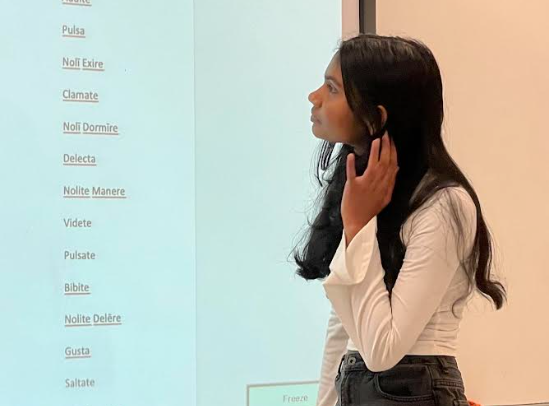
Menuli Uswatta studies various Latin phrases off the board. Ms. Pagos often allows her students to teach other classmates on the Promethean using fly swatters as pointers.
With the course registration processes underway, students have spent much time meticulously selecting classes with which to fill their elective spots. While photography, forensic science and yoga fill up quickly, many less popular electives are often overlooked.
The computer science department is dominated by students taking Foundations of Technology and AP Java to satisfy their technology credit requirement. Website development also falls under this department, but receives much less buzz. This year’s class has just 17 students.
Website development has been offered at RM for three years, and is taught by Mrs. Kimberly Gustin. The full-year course covers why and how websites are created, and then allows them to develop their own websites.
For the first part of the year, students complete short research assignments where they explore websites for aspects like color and layout choices. Later in the year, they begin learning the programming aspect of website development, first with lessons in Code.org, and then moving onto more complicated programming languages like HTML, CSS and JavaScript.
While homework is minimal, students complete many individual and group projects where they design web pages or full websites. Mrs. Gustin tries to assign website topics students are interested in. “The last big project that they did, they had a choice to make a website on Disney plus offerings, like a new launch for their shows,” she said. Before winter break, the students also completed a website on the top ten toys of the holiday season.
At the end of the year, students create a website that summarizes everything they’ve done during the course as a cumulative project. “They got the most out of that project because then they could look back and see how much they learned in the process,” Mrs. Gustin said. “A lot of them said, ‘Wow, I had no idea that I could learn that much in one year.’”
Website Development does not require any prerequisite courses. However, it does not satisfy the tech requirement, meaning the class is mostly juniors and seniors.
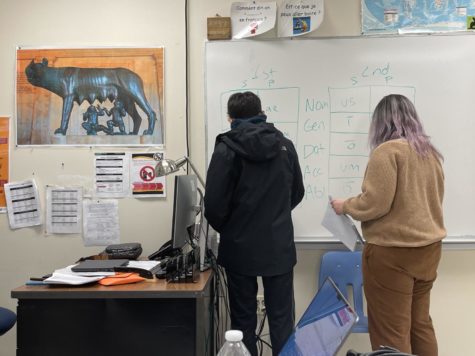
Mrs. Gustin recommends the class for students who are interested in business. “It’s a great marketing tool because more and more people are buying online,” she said. “Knowing how to do this opens a lot of doors for when they want to go to college and even pursue a career in this area.”
Additionally, website development offers a creative take on traditional computer science courses. “There’s just so much choice,” Mrs. Gustin said.
In the music department, orchestra, band and chorus are common elective choices, with some ensembles having upwards of 40 students. Piano, however, is much more limited in enrollment.
As the school has 16 keyboards available, only 16 students are in the class. RM currently only offers piano one, but hopes to add a level two next year.
Piano is structured as an independent study class. Each student has their own keyboard to practice on, equipped with headphones so they can only hear themselves.
Students have one music theory assignment per week. On other days, they are individually practicing scales, piano technique, or short pieces. The students also receive one-on-one lessons from the piano teacher, Ms. Sidney Clarke.
Every other week, students have a performance assessment in which they are graded on their piano skills as they play a scale or a piece selected by Ms. Clarke. Students are not expected to have a piano at home, therefore, they do most of their practicing during class.
The piano class holds a recital once a quarter, in which students get a chance to perform a piece on the grand piano in front of their classmates.
Although this may seem like a lot of performance assessments, Ms. Clarke is more focused on improvement than skill. Students are given a daily practice grade based on whether they are making an effort. “I’m not always grading you on, are you the best piano player ever,” Ms. Clarke said. “It’s more of, are you playing the piano? Are you enjoying it?”

Piano class does not stick to just classical repertoire, but branches into pop music quite often. Ms. Clarke allows her students to bring in their favorite songs to practice on their own or suggest to the class. She understands that students get more excited to practice when they already know the song.
According to Ms. Clarke, the most rewarding part of the class is seeing students grow. “It’s really exciting to watch students become leaders within the class, starting from quite literally that most beginning level to now being advanced musicians,” she said.
Students of all experience levels can join piano. It is a great elective option for students looking to add some creativity to their school day. “I really recommend having a moment in your day where you’re able to just put your pencil away, put your book down and just focus on creating music,” Ms. Clarke said.
The world language department is dominated by Spanish, French and Chinese. Latin, on the other hand, receives much less attention.
This year, there are 28 students in Latin one and 19 students in levels two, three, four and AP, which are a combined class.
Latin students study out of the Cambridge Latin Course (CLC) textbooks, which are divided into units based on areas of the world. “In Latin one, we do the Pompeii series, then we go to Britain and then Alexandria, Egypt. So we have the world in the first century AD,” Latin teacher Ms. Marianne Pagos said.
The CLC textbooks include readings that introduce students to the cultures and events of the places they are studying. In this way, the students learn the language and the history at the same time. “Vocabulary is always couched in reading so that you can develop this ability to look at a sentence and a passage and get an idea of what’s going on by exploring it,” Ms. Pagos said.
Latin is unlike other languages offered at RM in that the goal is reading, not speaking. As it is a classical language, Latin scholars use the language as a way to interpret ancient texts, not as a way to converse.
Latin students are not given speaking assessments the way a French student might. Most of their assessments are taken directly from the CLC books, and focus on vocabulary and reading comprehension. However, students do practice putting voice to the language by reading passages out loud in Latin before translating them into English.
Alex Saltzman, a graduate student at the University of Maryland and an intern with Ms. Pagos, shared the value of learning Latin in the modern world. “One of the things that I took away from studying Latin for so long is that over the course of our history, we don’t tend to change that much. You can see the patterns over and over and over again,” he said. “So it’s incredibly useful for understanding the modern world.”
Additionally, understanding Latin helps one understand how modern languages work, as it is the basis for English, Spanish, Italian, French and many other languages. “It’s a great course because it incorporates culture, literature, and the history of the last 2000 years,” Ms. Pagos said.
RM offers many other lesser-known electives, such as ASL, Astronomy and Guitar. Many students struggle with wanting to take more electives than they can fit in their schedule, which makes single-semester electives like Women’s Studies and Wildlife Biology a great option. “It’s a lot less of a commitment to take a semester long class than a full year class,” junior Shoshana Peck said.
Some students can find the number of classes available overwhelming, especially when each course is not described in sufficient detail. “I think the slideshow course catalog is really helpful,” Peck said. “I do wish there was more information.”
Your donation will support the student journalists of The Tide, Richard Montgomery High School's student newspaper. Your contribution will allow us to purchase equipment and cover our annual website hosting costs.
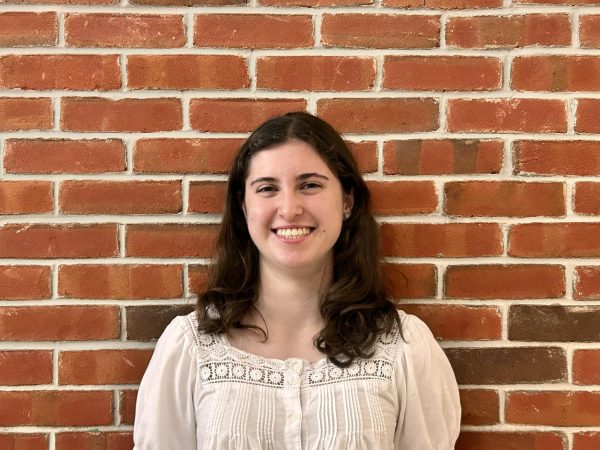
Elena Parisi is a senior and is so excited to be back as a Features Editor. This is her third year with The Tide, after being a Features writer...


